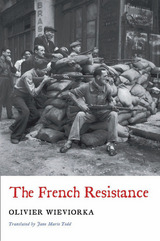
“Whatever happens, the flame of French resistance must not and will not go out.” As Charles de Gaulle ended his radio address to the French nation in June 1940, listeners must have felt a surge of patriotism tinged with uncertainty. Who would keep the flame burning through dark years of occupation? At what cost?
Olivier Wieviorka presents a comprehensive history of the French Resistance, synthesizing its social, political, and military aspects to offer fresh insights into its operation. Detailing the Resistance from the inside out, he reveals not one organization but many interlocking groups often at odds over goals, methods, and leadership. He debunks lingering myths, including the idea that the Resistance sprang up in response to the exhortations of de Gaulle’s Free French government-in-exile. The Resistance was homegrown, arising from the soil of French civil society. Resisters had to improvise in the fight against the Nazis and the collaborationist Vichy regime. They had no blueprint to follow, but resisters from all walks of life and across the political spectrum formed networks, organizing activities from printing newspapers to rescuing downed airmen to sabotage. Although the Resistance was never strong enough to fight the Germans openly, it provided the Allies invaluable intelligence, sowed havoc behind enemy lines on D-Day, and played a key role in Paris’s liberation.
Wieviorka shatters the conventional image of a united resistance with no interest in political power. But setting the record straight does not tarnish the legacy of its fighters, who braved Nazism without blinking.

The Allied landings on the coast of Normandy on June 6, 1944, have assumed legendary status in the annals of World War II. But in overly romanticizing D-day, Olivier Wieviorka argues, we have lost sight of the full picture. Normandy offers a balanced, complete account that reveals the successes and weaknesses of the titanic enterprise.
In addition to describing the landings with precision and drama, Wieviorka covers the planning and diplomatic background, Allied relationships, German defensive preparations, morale of the armies, economics and logistics, political and military leaders, and civilians’ and soldiers’ experience of the fighting. Surprisingly, the landing itself was not the slaughter the general staff expected. The greater battle for Normandy—waged on farmland whose infamous hedgerows, the bocage, created formidable obstacles—took a severe toll not only in lives lost, but on the survivors who experienced this grueling ordeal.
D-day, Wieviorka notes, was a striking accomplishment, but it was war, violent and cruel. Errors, desertions, rivalries, psychological trauma, self-serving motives, thefts, and rapes were all part of the story. Rather than diminishing the Allied achievement, this candid book underscores the price of victory and acknowledges the British, American, and Canadian soldiers who dashed onto the Normandy beaches not as demigods, but as young men.

On July 10, 1940, by a 570 to 80 margin, the representatives in the French parliament voted full powers to Philippe Pétain, ending the Third Republic and paving the way for the collaborationist Vichy regime. Olivier Wieviorka offers a nuanced portrait of the individuals who determined the fate of France at this critical moment.
Pétain claimed to be saving France from ruin. The day of the vote has been described as a journée des dupes, the legislators so ignorant or fearful that they voted without a thought to the consequences. But Wieviorka shows that most of the deputies made a considered decision to vote for Pétain. He analyzes the factors, such as political culture and regional origins, that motivated the voting on both sides, and traces the men’s fates through the war.
Recreating the tense atmosphere of summer 1940, Wieviorka shows how pressures brought on by defeat could affect even the most hardened republicans. He illuminates the complex moral issues inherent in accommodation and collaboration in a time of crisis.

READERS
Browse our collection.
PUBLISHERS
See BiblioVault's publisher services.
STUDENT SERVICES
Files for college accessibility offices.
UChicago Accessibility Resources
home | accessibility | search | about | contact us
BiblioVault ® 2001 - 2024
The University of Chicago Press









